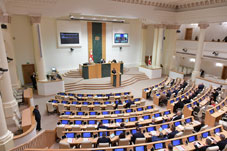Parliament Tightens Penalties for Protest Offenses

Adopted unanimously, the amendments to the Administrative Offenses Code and the Criminal Code increase fines and allow immediate detention for certain violations. Participants who cover their faces, carry pyrotechnics or intoxicants, block roads, or erect temporary structures can now face up to 15 days in detention, while organizers risk up to 20 days. Repeat offenses or participation in protests disbanded by the Interior Ministry may result in up to one year in prison, or two years for repeat violations. Organizers whose actions cause "serious consequences" could face up to four years.
Previously, most offenses carried only a 5,000 GEL fine, but authorities argued that penalties were too lenient. Georgian Dream Prime Minister Irakli Kobakhidze said a small group of protesters "should not be allowed to oppress the majority" by blocking the capital's main street nightly for over 320 days.
Civil society groups warned that the changes effectively "ban peaceful protest." The law also expands penalties for disobeying police and carrying weapons or hazardous materials at demonstrations. Certain groups: pregnant women, minors, people with disabilities, and mothers with young children will face fines instead of detention.
Five Russian Nationals Arrested in Georgia on Money Laundering Charges

At a press briefing on October 16, Guga Tavberidze, deputy head of the Finance Ministry's Investigative Service, said that an unidentified company had been operating without authorization from the National Bank of Georgia. "The company had been providing crypto asset services without proper registration or authorization," Tavberidze stated, adding that it ran "an illegal office" and offered a "courier service" for its clients.
According to Tavberidze, the company carried out transactions worth "hundreds of millions of lari" over several months, facilitating unregulated international transfers. "The investigation also found that Russian citizens had allegedly been bringing large amounts of foreign currency into Georgia by car, apparently bypassing border controls, to purchase virtual assets and then legalize illicit funds," he said. "Despite the scale of these operations, neither the company nor the individuals involved were found to have made any tax payments to the state budget."
Authorities confiscated 721,000 U.S. dollars, along with accounting records, documents, and computer equipment. The cash was seized from the company's office and vehicles bearing Russian license plates.
The case is being investigated under Articles 192 and 194 of the Georgian Criminal Code, which cover illegal entrepreneurial activities and the legalization of illegal income. Convictions under these articles carry prison sentences of nine to twelve years.
Tavberidze said the investigation remains active as officials work to identify other individuals who may have participated in the alleged scheme and to collect additional evidence.
